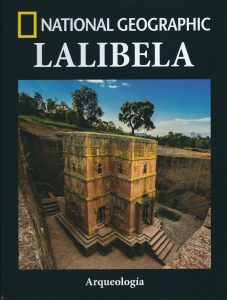
The Ethiopian Christmas differs in many aspects from ours, even though both have the same origin and meaning. While we celebrate it on a fixed date, December 25th, in Ethiopia, they do so in a cyclical manner due to the peculiarities of their calendar. The day of Genna (Christmas) falls on the 29th of the month of Tahsas for three years, and on the 28th of Tahsas in the fourth year. Neither of the two days coincides with our Christmas day since Ethiopians use a calendar based on the Julian system, and their Christmas begins in our month of January. Additionally, Christmas day must be celebrated nine months and five days after the Annunciation to fulfill the gestation period.
Celebrating Christmas in Lalibela.
This is not exclusive to Ethiopia. While Western Christianity adopted the Gregorian calendar in the 16th century, the rest of Christians continue to use the Julian calendar, which predates the Gregorian and is less accurate. It does not coincide with the Gregorian calendar in terms of dates or the calculation of holidays like Easter. To make it more complicated, Ethiopians use their own calendar based on the Egyptian Coptic, which is very similar to the classical Julian calendar. The term ‘gänna’ is a loanword from the Greek ‘genna’ (birth), as in Ge’ez, the local language, the word ‘Lidet’ can also be used with the same meaning.
Christmas is a joyful celebration in Ethiopia as it marks the birth of Christ, who became human to save humanity from sin. The significance of this festival requires the sacrifice of numerous goats, oxen, and sheep, as well as the preparation of large quantities of homemade beer (‘tella’) for the Christmas meals. Wealthy families choose castrated rams or oxen, while poorer families settle for acquiring other, more affordable animals, usually birds. Women make a great effort in preparing the beer, ‘tej’ (mead), the spicy chili pepper ‘bärbärre,’ and various spices used in Ethiopian cuisine.
To the left, a plate of doro wat. To the right, a bottle of tej.
Like in any celebration, there is a social code that should not be violated. A young married and exemplary man has his Christmas obligations, including giving his parents a ram or a castrated lamb as a gift; in addition, he must invite his in-laws to spend Christmas day at his home. New clothes are also acquired for the entire family.
A curious tradition of Ethiopian Christmas is the game of gänna, a kind of hockey very popular among young people, believed to be invented by shepherds who received the good news of the birth of Christ. Children get the sticks from the forests near the villages, choosing those that end in a curved shape, and then decorate and pass them through the fire. The balls are made of leather. Until Christmas day, children play gänna during the day, while the young people play it by moonlight.
In the upper image, on the left, women praying on the day of Genna. On the right, men are getting ready to play Genna.
The day before Christmas, known as Gad, is a fasting day that can never be omitted. At dawn on Genna day (Christmas), people dress in white with the traditional shamma, a piece of cotton with which they wrap their heads and bodies. They then go to their respective parishes to attend religious services, usually around four in the morning. After the mass, people return home, where they begin to sacrifice the animals that will be consumed during the day. The meat is prepared raw, cooked, or roasted, and close family members, and sometimes neighbors, gather for the Christmas feast. Drinks abound, and it is not uncommon for men to end up intoxicated. The quintessential Christmas dish is doro wat, a kind of spicy chicken stew with vegetables, sometimes with the addition of eggs. Doro wat is served on a thin sheet of injera, the Ethiopian bread made from teff.
Children dressed in typical Christmas attire.
After the meal, children put on their new clothes and run to the genna playing field, usually an uncultivated land. There, they form teams and choose their respective captains. They also dig the hole where they will place the ball at the start of the game and determine which areas of the field need to be reached to score. The game is quite rough, and it’s not uncommon for a player to end up with a broken bone.
To conclude, as a curiosity, the expression in Amharic to wish Merry Christmas is Mälkam Gänna / Melkam Genna (translated as Merry Christmas), which is written in Ethiopian characters as follows:
መልካም ገና








 https://orcid.org/0000-0003-2855-3195
https://orcid.org/0000-0003-2855-3195
Deja una respuesta